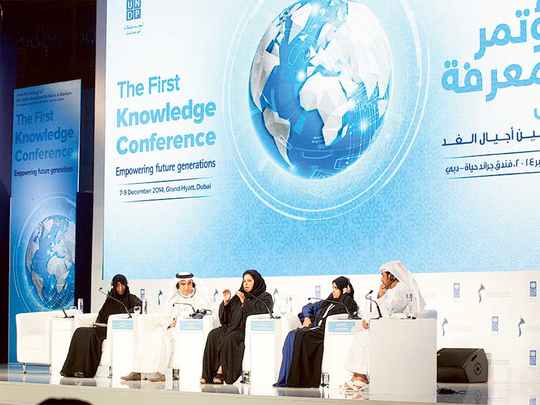
Dubai: The Arab world needs 17 million new job opportunities by 2020 to prevent unemployment from sliding to deeper levels per capita, the Arab Knowledge Report found.
Unemployment in the Arab World, especially among the youth, is one of the most pressing issues preventing the region’s knowledge economy from flourishing, said Dr Gaith Fariz, Director and Coordinator of the Arab Knowledge Report, which was launched during the second day of the Knowledge conference on Monday.
The report found that youth account for more than 50 per cent of the total population of those unemployed in the Arab World.
Fariz said this is disconcerting because a large percentage of the Arab world are youth and will continue to be so, as more than half of the population in the Arab region fall under the age of 25 and by 2015 the percentage of youth below the age of 15 will be 33 per cent.
“A total of 17 million jobs are needed by 2020 to maintain the current unemployment rate and prevent it from increasing. However, to provide everyone with jobs and end unemployment, around 56 million job opportunities are needed.”
He said it is estimated in the Arab world that less than 45 per cent of the population is employed.
For the percentage to reach 64 per cent, 80 million jobs must be created by 2020.
Another critical area of development is the lack of focus on scientific research in the Arab world.
Fariz said the Arab world spends the least worldwide on scientific research (0.07 per cent of its GDP).
“The total number of documented patents by 18 Arab countries since 1963 until 2013 is 1,821. This is equivalent to less than the total number of one small country like Malaysia. This is an alarmingly low number.”
Fariz said one of the reasons for the lack of focus and funding on research is “there is no link between making money and research and the brain drain caused by the immigration of 35 per cent of youth who completed their higher education.”
The environmental factors that are affecting knowledge development in the Arab world like unemployment, poverty, occupation, wars and financial crises, have also contributed to the high illiteracy rate in the region.
Statistics shared at the conference found that there are 51.8 million illiterate people in the Arab world, 66 per cent of whom are females. There are also 6.9 million illiterate youth aged 15 to 24 and females account for 64 per cent, while 4.5 million children are not attending schools and 57.8 per cent are female.
When it comes to internet use, the use of Arabic language has shown high growth, as it is currently the fourth most used language used on the internet and has witnessed a growth of 5.29 per cent from 2000 to 2013.
The number of people using the Arabic language on the internet on 2011 was around 135.6 million compared to 60 million users in 2008.
Fariz said the Arab world must put an effective strategy to develop youth’s energy and turning them into production forces to build society and the country as a whole in all sectors.
Organised by the Mohammad Bin Rashid Al Maktoum Foundation, the three-day-conference will address some of the most critical issues related to knowledge transfer and localisation through a variety of sessions with reference to the Arab Knowledge Report 2014.












